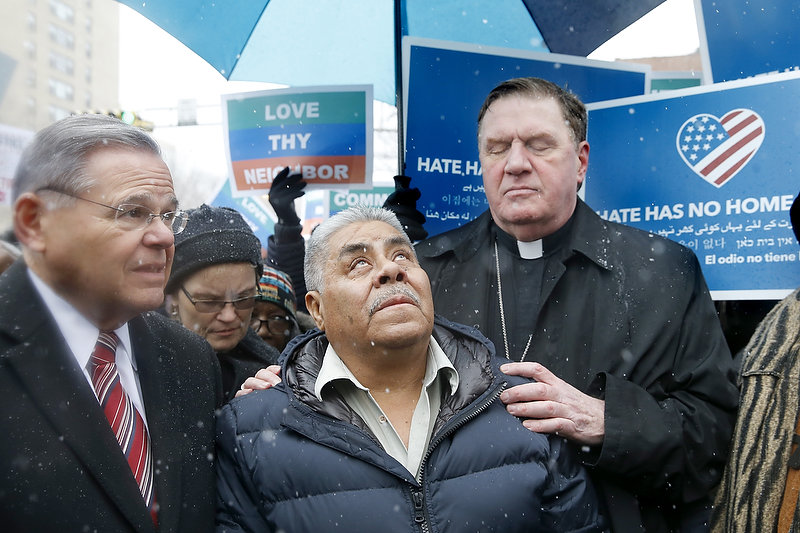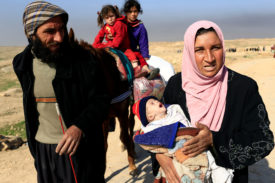
WASHINGTON (CNS) – While one Catholic archbishop was urging a fix to the country’s immigration laws before a Catholic crowd, another was pleading with the government not to separate mothers from their children while in immigration detention, and yet another, a cardinal, was accompanying a grandfather to an appointment that could have resulted in his deportation.
Catholic Church leaders in the U.S. spent the week of March 6-10 trying to allay fears, urging compassion, not just from the government from those who are not seeing “God’s creation” when they malign unauthorized immigrants.
“In the church, we say, “Somos familia!’ Immigrants are our family. We say, ‘En las buenas y en las malas.’ In the good times and in the bad. We always stay together,” said Archbishop Jose H. Gomez of Los Angeles, in an address to those who attended the Napa Institute’s Washington conference. “That is why the church has always been at the center of our debates about immigration. And we always will be. We cannot leave our family alone, without a voice.”

Archbishop Gomez, vice president of the U.S Conference of Catholic Bishops, said immigration is the “human rights test of our time” and said that having a policy that solely focuses on deportations without addressing reform of the immigration system risks causing “a human rights nightmare.”
He said it’s not morally acceptable to say: “It’s their own fault,” or “This is what they get for breaking our laws.”
“They are still people, children of God, no matter what they did wrong,” Archbishop Gomez said.
He said he was concerned because people seem to be incapable of showing mercy, or to see in another person, for example, an unauthorized immigrant, a child of God.
“And so we are willing to accept injustices and abuses that we should never accept,” he said.
In Texas, Archbishop Gustavo Garcia-Siller of San Antonio was pleading with the government to stop plans that would separate children from mothers in immigration detention centers, a proposal confirmed by U.S. Homeland Security Secretary John Kelly.
Calling it an “unjust and inhumane method of border enforcement,” Archbishop Garcia-Siller said the proposal had been put out into the public sphere with the suggestion “that once this is known, it will serve an example to discourage future such attempts at entering our country illegally.”
“With my brother bishops and millions of people of goodwill, I must say that the willful separation of families is a terrible injustice on its face!” he said, adding that it is “an assault on the human dignity we proclaim and uphold.”
Archbishop Gomez in his address said politics today are more divided “than I can ever remember” and “by our inaction and indifference we have created a quiet human rights tragedy that is playing out in communities all across this great country.”
While all can agree that a person who commits a violent crime and is not authorized to be in the country should be deported, “what is the public policy purpose that is served by taking away some little girl’s dad or some little boy’s mom?” Archbishop Gomez asked.
“Right now the only thing we have that resembles a national immigration ‘policy’ is all focused on deporting these people who are within our borders without proper papers,” he said.
And while some people see them as less than human, these “millions of men and women” are living as “perpetual servants – working for low wages in our restaurants and fields; in our factories, gardens, homes and hotels.”
“Why aren’t we punishing the businesses who hired them, or the government officials who didn’t enforce our laws? It just does not seem right to me,” Archbishop Gomez said.
While saying that the deportation situation is not new and that President Barack Obama had deported more people than any other president, “the sad truth is that the vast majority of those we are deporting are not violent criminals,” he said.
The week ended with Cardinal Joseph W. Tobin of Newark, New Jersey, accompanying a 59-year-old grandfather in New Jersey, Catalino Guerrero, who was facing deportation after living in the U.S. for 25 years. Cardinal Tobin prayed with Guerrero, who was subsequently granted a short-term stay but needs to see immigration officials again in May and still faces deportation.
According to a report by NJ Advance Media, Cardinal Tobin later said: “I can’t accompany the 11 million undocumented people in this country, what I hope to do is say look they’ve got faces, they’ve got histories and there’s a lot of advantage to leaving them alone.”
In his Tablet column, “Into the Deep,” Bishop Nicholas DiMarzio has said, “For the most part, most undocumented bread earners, and sometimes spouses and children, are coming to our system for work.
“When I think of this situation, I cannot help but recall the words of Saint John Paul II who said that the key to the social question is work. How we treat workers truly defines our nation. We cannot on one hand benefit from the work of aliens with or without status, and not offer to them the same support that we give to regular workers such as Social Security and workers compensation, as well as other work benefits.
“In speaking about his visit to Lampedusa in 2013, Pope Francis said, ‘I felt I had to go, I was touched by the news of migrants who had died at sea, who had drowned.’
“Certainly, there are many other things that could be said. From the moral perspective, however, we must shy away from policies which when carefully examined exhibit racism, nativism and xenophobia, which is the fear of stranger, sentiments. The work of the Church is to bring the truth to the public forum.
“Hopefully, we can continue to combat ill-conceived immigration restrictions which the majority of the American public does not even support.
“Any excursion into this area of policy making will generate many letters to the editor, however, it is time for me to speak, as I have in the past. The defense of the alien, no matter what their status, is our obligation, since we put out into the deep trying to understand the Lord’s injunction, ‘I was a stranger and you welcomed me.’”
